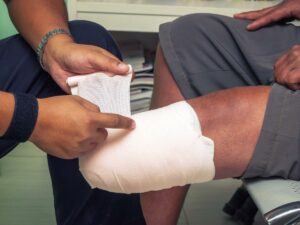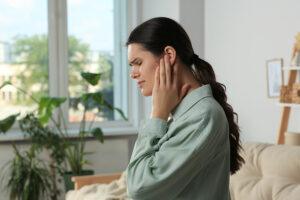The Vital Facts
- Accidental poisoning ranks 9th among causes of injury hospitalisation in Australia, with over 8,800 cases and 1,400 deaths annually.
- Pharmaceutical drugs, both prescribed and acquired otherwise, account for 80% of accidental poisonings in 2021-22.
- Other substances like alcohol, solvents, and pesticides make up the remaining 20% of cases.
Poisoning injuries can occur anywhere, whether you’re at home, in the workplace, on a camping trip, or on a beach trip in the summer.
Understanding both how to prevent the dangers of poisoning and respond to poisoning injuries is important.
In this article, we will explore what poisoning injuries are, how to avoid them, how to recognise their symptoms and provide essential first aid for poisoning in cases of emergency.
Here’s a summary of what you’ll find below:
- What is a poisoning injury?
- What are the common causes of poisoning injuries?
- How to prevent poisoning injuries
- What are the signs and symptoms of poisoning injuries?
- First Aid for Poisoning
What is a Poisoning Injury?
Poisoning occurs when a person inhales, ingests, absorbs or gets a dose of a poisonous substance. Left untreated, the effects of poisoning can include short-term illness, coma, brain damage or death. A poisoning injury can happen intentionally or accidentally – and when this happens, first aid for poisoning can help save a life.
What are the Causes of Poisoning Injuries?
Poisoning happens when a person is exposed to a substance in an amount that harms the body. In fact, it’s one of the most common reasons for injury hospitalisation in Australia.
Among the common causes of poisoning injuries are the following:
- Overdose of prescription and over-the-counter medicines
- Supplements and herbal medicines
- Alcohol and other substances of abuse
- Chemicals, such as cleaning products and pesticides
- Animal venom e.g. snake bites, spider bites
- Toxins from plants
How to Prevent Poisoning Injuries?
To avoid poisoning injuries and reduce the complications of poisoning, it helps to be cautious and aware of your surroundings – this can help protect you and your family from the risks of poisoning.
You can follow these precautionary steps to prevent poisoning injuries:
- Label potentially poisonous items such as cleaning products, chemicals and medication. It’s always best to keep them in their original containers.
- Keep all dangerous substances in childproof locked cabinets and closely supervise children (especially visitors) around your home.
- When handling medicine, go to a well-lit room, read the label and follow instructions carefully.
- Avoid taking medicine in front of children, especially if they’re at the age when they like to copy adults.
- Wear appropriate protection when tending to your garden or shed and make sure that the plants you have are not poisonous.
- Throw out dangerous chemicals that you no longer need at the nearest hazardous waste disposal service.
- In case of emergencies, familiarise yourself with the signs, symptoms as well as emergency first aid for poisoning.
What are the Signs and Symptoms of Poisoning?
Signs and symptoms of poisoning that you need to watch out for include:
- Redness around the mouth and lips
- Vomiting
- Drowsiness
- Difficulty in breathing
- Breath that smells like chemicals
- Confusion or unusual mental status
First Aid for Poisoning
In cases of poisoning, immediately call the Poisons Information Centre at 13 11 26. While waiting for help, you can follow these poisoning first aid instructions:
1. In case of swallowed poison:
- Pick up the bottle or packet and take it to the hospital so they have more information.
- DO NOT induce vomiting – this could potentially cause more harm.
2. In case of inhaled poison:
- Open the surrounding doors and windows wide to increase ventilation.
- Let the person get fresh air as quickly as possible.
3. In case of skin exposure to poison:
- Avoid getting in contact with the poison yourself.
- Try to remove the affected clothes.
- Flood the affected area with cool running water for 15 minutes.
- Wash the affected area with soap and water.
4. In case of eye exposure to poison:
- Hold eyelids open.
- Carefully flush the eyes of the patient thoroughly with water, if possible, ensure you flush under the eyelid as well
5. Take note of the following when reporting a poisoning injury:
- What substance the person was exposed to
- The amount of poisonous substance that was ingested, inhaled or injected
- When and how the person was exposed (skin contact, inhalation, swallowing)
- The symptoms observed after exposure to the poison
The best way to prevent poisoning injuries is to educate yourself and others about poisoning because knowledge is always the first line of defence. It’s important to be aware of poisonous substances and be cautious when using them to avoid poisoning injuries.
Complete a First Aid Course!
You’ll immediately feel more comfortable and confident!
If you want to ensure the safety of you and your family in the home, it’s important that you have the knowledge and skills to confidently administer first aid for poisoning and respond to a medical emergency until professional medical assistance is available.
At Vital First Aid, our qualified first aid trainers are highly skilled and experienced, and all first aid students will receive a First Aid Certificate on completion.
To benefit from our range of first aid courses, sign up here.






